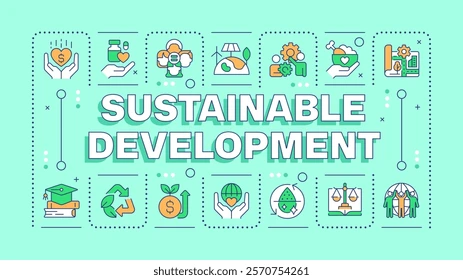Sustainability is the practice of meeting the needs of the present without compromising the ability of future generations to meet their own needs.
It is about finding balance between economic growth, environmental protection, and social well-being.
At its core, sustainability focuses on responsible use of resources.
It reminds us that Earth’s resources are limited and must be used wisely.
Sustainability covers many areas of life.
It includes energy, water, food, transport, waste, and even lifestyles.
The aim is to reduce harm to the environment while improving human quality of life.
A key part of sustainability is renewable energy.
Using solar, wind, and hydro power reduces reliance on fossil fuels.
This helps cut down on pollution and greenhouse gas emissions.
Another aspect is sustainable agriculture.
Farming methods that protect soil, conserve water, and avoid harmful chemicals are vital.
Waste management is also important.
Recycling, reusing, and reducing waste help conserve raw materials.
Sustainability is also about fairness.
It ensures that all people have access to clean air, water, and food.
It links closely to social justice and equity.
Communities should not suffer due to pollution or resource exploitation.
Education plays a key role in promoting sustainable habits.
People must learn to make eco-friendly choices in daily life.
Even small actions like saving electricity or avoiding plastic can help.
Businesses also have a responsibility.
They should adopt green practices and reduce their carbon footprint.
Governments must enforce laws to protect nature and resources.
Together, individuals, industries, and governments can create change.
Sustainability is not only about the environment.
It is also about building a stable economy and a fair society.
Future generations depend on the choices we make today.
If we fail to act, natural systems may collapse.
Sustainability reminds us that we are caretakers of the planet.
It is a shared duty to preserve Earth for tomorrow.
sustainability is life's true key

Record
Recording 00:00
Commenting has been turned off for this post.
Categories
- Sustainability
- Home
- Wellness
- Theater
- Sports
- Shopping
- Religion
- Party
- Other
- Networking
- Music
- Literature
- Art
- Health
- Gardening
- Games
- Food
- Fitness
- Film
- Drinks
- Dance
- Crafts
- Causes
Read More
Democracy
In all the times kings and employees rude over the message they made lost and imposed taxes...
Sustainability and the Conservation of Microbes
Sustainability also plays a crucial role in the conservation of microbial diversity, which is...
Effective communication
Effective communication is key to building strong relationships and achieving success. It...
Curiosity about from where the meteor come!
Most meteoroids are pieces of other, larger bodies that have been broken or blasted off. Some...
Human-Machine Symbiosis: The Future of Brain-Computer Interfaces
Brain-computer interfaces (BCIs) are no longer confined to the realm of science...
×
Your daily access limit has been reached. Please try again tomorrow.
© 2025 GoSharpener Pvt.Ltd.
Refund and Cancellation policy - We do not entertain any refunds and cancellation
Refund and Cancellation policy - We do not entertain any refunds and cancellation
